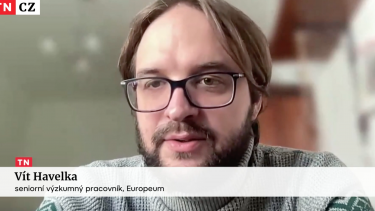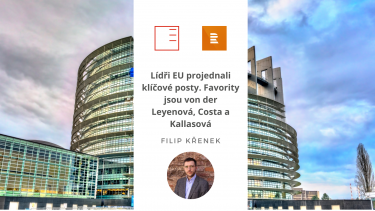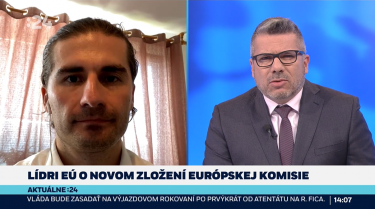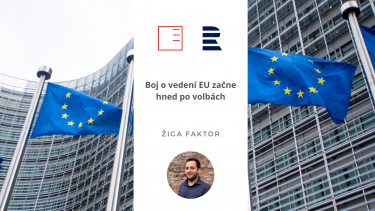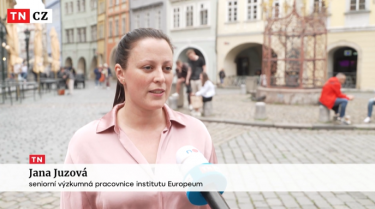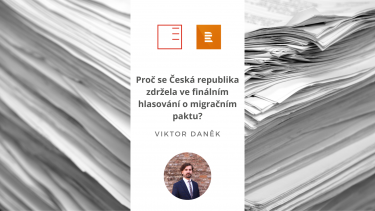TV Nova | Personnel Changes in European Institutions
After the European elections, institutions in Brussels are facing personnel changes. Who is likely to assume the most important positions, namely the the head of the European Council, the European Commission, and the European Parliament? Vít Havelka, senior researcher at EUROPEUM Institute, commented on this in the main evening broadcast on TV Nova.
Show more
ČRo Plus | EU leaders discuss key positions. The favorites are von der Leyen, Costa, and Kallas
On Monday 17 June, the leaders of the European Union Member States headed to Brussels for their first joint meeting after the European Parliament elections. They discussed the distribution of key posts at the head of the EU institutions - the President of the European Commission, the European Council and the European Parliament. Filip Křenek, project coordinator and analyst at EUROPEUM Institute, commented on the likely distribution of forces for ČRo Plus.
Show more
RTVS | EU leaders discussed the new European Commission
On Monday, June 17, an informal meeting of the 27 member states of the European Union took place. Their leaders discussed the nominations of members for the new European Commission. Ursula von der Leyen will also have to compete for her position as President of the European Commission again. Viktor Daněk, Deputy Director of EUROPEUM Institute, discussed her chances on the Slovak television RTVS.
Show moreCzech radio | The battle for EU leadership will start after the elections
The elections are not the end of the fight for the very leadership of the European Union. The coming weeks and months will decide the new leadership of the European Commission, the European Council, and the European Parliament. What will follow? Deputy Director and Head of the Brussels Office of EUROPEUM Institute, Žiga Faktor, answered questions for Czech Radio stations Radiožurnál and Plus.
Show more
TV Nova | Brussels will deal with the enlargement of the Union. Among the candidates are Turkey or Ukraine
The elections to the European Parliament are less than a week away, and one of the main topics that Brussels will have to deal with in the coming years is the enlargement of the European Union. A total of nine countries are waiting to join the EU, but according to experts, rapid expansion is unlikely. The President of the European Council, Charles Michel, talks about the possibility of enlargement until 2030, which requires reforms from both the candidate countries and the Union itself. Jana Juzová, researcher at EUROPEUM Institute, commented on the situation for TV Nova.
Show moreČRo | Czech Republic abstains in the final vote on the migration pact
The Migration Pact heads to its final vote in the Council of Ministers. The Czech Republic will abstain in this final vote. What is the process of approval within the European Union? What led to the change of position? And what are the implications for the EU of the just-approved migration pact? Viktor Daněk, Deputy Director of EUROPEUM Institute, comments for Czech Radio.
Show moreTA3 | Results of the extraordinary summit in Brussels
At the extraordinary summit of European Council in Brussels, the original economic debates quickly turned to serious geopolitical issues, such as the extension of sanctions against Iran and the strengthening of Ukrainian air defenses. However, as pointed out by Vít Havelka for Slovakian TA3, an analyst at the EUROPEUM Institute, there is no fundamental shift in the EU's approach to countries such as Russia, Israel or Iran.
Show more
BLOG | The Use of Article 7 as a Protection Tool for the Rule of Law and European Values
With Hungary taking over the EU presidency in July 2024, many are questioning the EU's ability to promote its values in its member states. Indeed, the EU is about to hand over its presidency to a state that has been criticised for its actions that threaten the rule of law and is subject to the procedure set out in Article 7 of the Treaty on European Union (TEU), writes Maxime Painot in his blog.
Show moreBLOG | The Use of Article 7 as a Protection Tool for the Rule of Law and European Values
Vzhledem k tomu, že Maďarsko převezme v červenci 2024 předsednictví v Radě EU, mnozí pochybují o schopnosti Evropské unie prosazovat své hodnoty v členských státech. EU se skutečně chystá předat své předsednictví státu, který je kritizován za své jednání ohrožující právní stát a podléhá postupu stanovenému v článku 7 Smlouvy o Evropské unii (SEU). Píše ve svém blogu Maxime Painot.
Show moreNovinky.cz | Migration Pact: Non-compliance could lead to fines
The Migration Pact consists of ten legislative proposals that passed the European Parliament last week. They still have to be voted on in the Council of Ministers. Failure to comply with these regulations could lead to lawsuits and heavy fines. Viktor Daněk, Deputy Director of EUROPEUM Institute, commented on the Migration Pact for Novinky.cz.
Show moreStaroměstské náměstí 4/1
Prague 1 - Staré Město
110 00
tel.: +420 212 246 552
email: europeum@europeum.org
https://www.europeum.org
